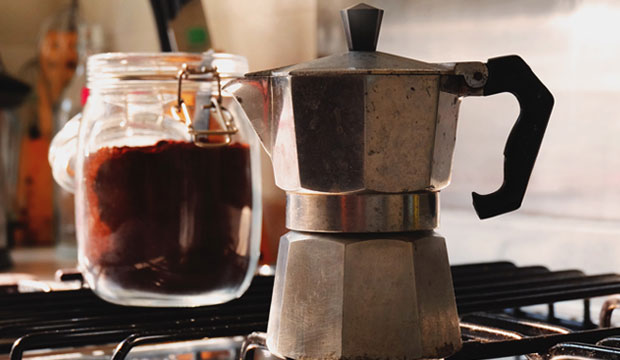
Unavailable Article No. 1760
Aroma(s) : Malty, Fruity
Article No. 1760

Unavailable Article No. 1762
Aroma(s) : Chocolaty, Fruity
Article No. 1762

Unavailable Article No. 1816
Aroma(s) : Malty, Fruity
Article No. 1816

Unavailable Article No. 1934
Aroma(s) : Chocolaty, Floral
Article No. 1934

Unavailable Article No. 1950
Aroma(s) : Nutty, Malty
Article No. 1950

Unavailable Article No. 10108
Aroma(s) : Chocolaty, Fruity
Article No. 10108

Unavailable Article No. 10129
Aroma(s) : Malty, Floral
Article No. 10129

Unavailable Article No. 10473
Aroma(s) : Nutty, Fruity
Article No. 10473

Unavailable Article No. 10474
Aroma(s) : Chocolaty, Nutty
Article No. 10474
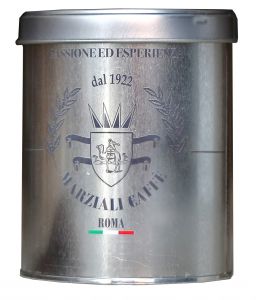
Unavailable Article No. 1245
Aroma(s) : Chocolaty, Floral, Fruity
Article No. 1245

Unavailable Article No. 10965
Aroma(s) : Chocolaty, Honey, Nutty
Article No. 10965

Unavailable Article No. 11372
Article No. 11372
For a perfect moka coffee with a moka pot
Small instructions for an espresso from the Caffettiera moka pot.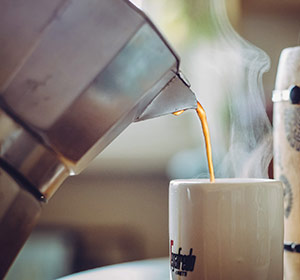
Water:
Fill the lower chamber of the cooker with cold water up to the level of the valve (do not overfill!)
Coffee:
Fill the filter completely with ground coffee (special grind moka coffee!), but please do not press or make a hill. (It is best to use freshly ground coffee or ready to use moka coffee)
Grinding degree:
For a good Mokka coffee from the Caffettiera, the combination of coffee type and correct grinding degree is decisive. Either you have your own grinder, with which you can grind the coffee beans accordingly coarsely, or you select already ground espresso in the MOKA grinder.
-
» Heat level: Keep the heat on a low flame
-
» Remove the coffee maker from the plate as soon as the coffee rises and bubbles.
(This is important to extract only the good ingredients of the coffee grounds)
-
» As soon as you hear a gurgling sound, the brewing process is complete
-
» Stir the coffee once again before filling the cups
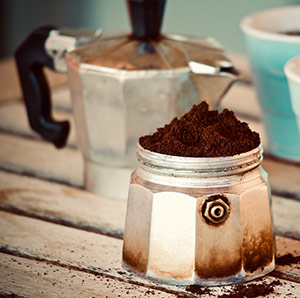
Cleaning the espresso maker: Rinse the stove with hot water and let it dry thoroughly before screwing it back together.
By the way, it is not true that a "patina" of dirt improves the coffee.
Unfortunately, this rumor still persists!
It is true that you should clean the mokka pot with mild and fragrance-free detergents.
Another Tip: Preheat your espresso cup with the hot water. This will keep your espresso warm longer.
MOCHA sounds like MOKA, but is it the same?
Caffè Mocha is a cappuccino derivative, it is based on cappuccino to which chocolate has been added. Caffè Mocha is also often called Mochaccino. All these drinks have one thing in common: the name derived from the port city of Moka, which has become a synonym for a soft balanced coffee with cocoa aromas for centuries - Moka, in short. In Austria, the little black coffee, is actually an espresso and is called Moka.
The best coffee for Moka
The best coffee is moka. A thesis supported by many people, as to emphasize the strong, unique and fragrant notes that only the homemade coffee pot is able to give.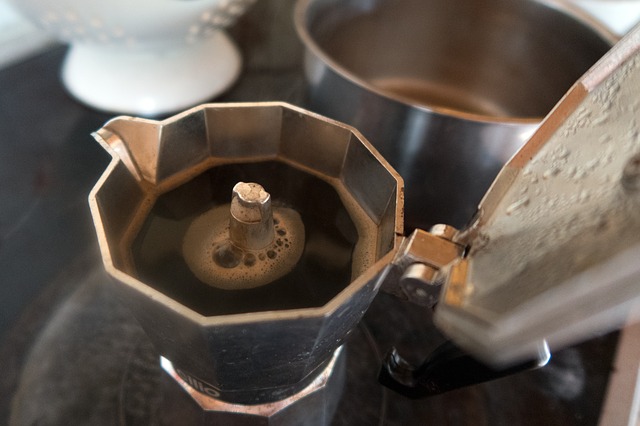
Simple and quick to prepare: the trusted companion of every awakening and every moment of sharing, in family as well as with friends. The coffee made with moka has a personal story for each of us.
It will be its unique taste notes, it's regenerating scent or even the classic and unmistakable gurgling sound of the coffee pot. The best coffee is what it tastes like at home.
For this reason, it is important to choose the best coffee, among the wide variety of blends available on the market, where the doors of a world made of unimaginable aromas, qualities, scents, flavors and colors are opened.
We, for our part, have always been committed to promoting new, special and above all quality blends.
How to make the perfect moka coffee?
Making a perfect coffee with mocha is child's play, yet there are many little tricks that can help you get the most out of your coffee maker without having to make a big effort.
Let's go over the basics and see what is the recipe for the perfect moka coffee. The shape and model of the moka is not important: it is the operating principle that counts.
First of all we have to insert the water: the tank valve, as many people know, serves as a guide to introduce the right amount of water and that level should never be exceeded. This is because the space of the tank that remains apparently empty is actually full of air that expands once heated by the fire of the stove. The expansion of the air pushes the water up through the lower part of the funnel filter.
For this reason, mistaking the ratio of water to air could ruin the quality of our drink and make it difficult to spill the coffee.
Which water to choose? Is the water from the tap okay, or is the bottled water preferable?
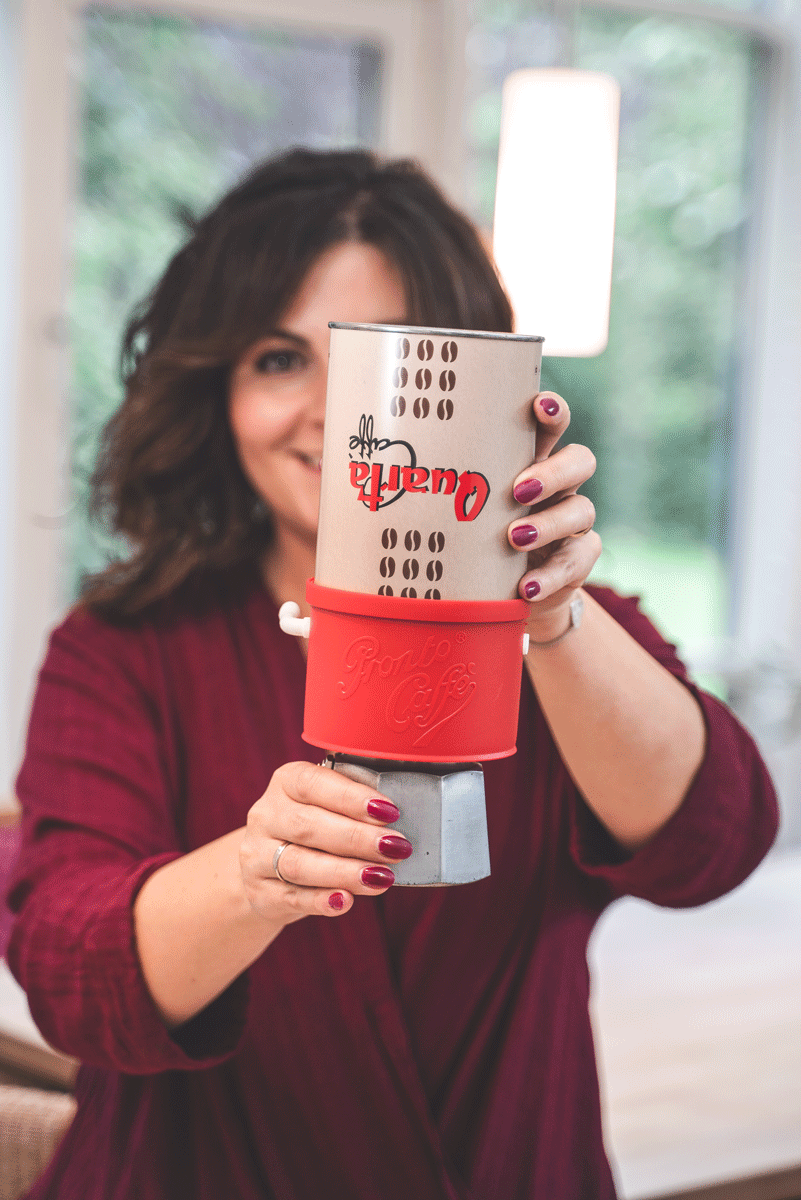
Both are fine, even if an oligomineral water, fresh, would be preferable. You should not choose water that is too calcareous, nor should you, contrary to what many people do, use hot water. It is the air pressure that brings the water up, not the hot water that boils. A little cold water can also be added in the extraction chamber (the upper part, where the coffee comes out and deposits the ready coffee) in the measure of no more than 1 or 2 teaspoons. This helps the first drops not to burn in contact with the hot metal of the coffee pot.
The funnel filter can be filled as desired, depending on how "strong" the extracted coffee should be. Leveling the surface of the coffee powder in the filter, with your finger or the handle of the spoon, allows you to obtain a light and soft coffee on the palate. A small mountain of ground blend that rises from the filter guarantees a more full-bodied result. The important thing is always to avoid crushing the blend, because this could compromise the output of the coffee or give it an unpleasant burnt taste.
If you then want to be sure to insert the right amount of coffee powder into the funnel filter, the most practical help comes from Quarta Caffè, with its practical Dosacaffè.
Another popular trick among those who just don't want to wait is the stove flame: big and high. More heat equals less waiting. Unfortunately, even this decision risks burning our coffee, taking away the time necessary for the coffee maker to perform its function properly and overheating the water in the tank. It is always advisable to keep a moderate flame during the whole preparation, also because preparing coffee is a ritual that should be celebrated as much as the moment you drink it.
When is the coffee ready? When does the last drop of the drink come out?
The coffee should be removed from the fire when the coffee pot begins with its typical gurgling. This moment is the most awaited by those who prepare it, because of the scent that spreads in the environment and because that typical noise is automatically associated with the pleasure of tasting.
Once the coffee pot is removed from the stove, it is necessary to stir the drink with a teaspoon before pouring it into the cups ... et Voilà: the perfect mokka coffee is served.
A few more tips for an outstanding coffee
Many people already know this: the coffee pot should only be cleaned with hot water and elbow oil, at most you can use a mild detergent. Using soap or aggressive detergents could interfere with the final result.
Another suggestion is not to close the lid of the coffee pot during coffee extraction. A well-measured and properly made coffee will not splash the stove. However, it remains important to constantly monitor the extraction, to verify at what point is our drink.
If you really do not trust the coffee pot, then you can place a small upside-down teaspoon on the chimney (the nozzle where the coffee comes out). In this way the liquid will be forced down, while the steam will be free to come out of the coffee pot.
Finally, for the most appetizing, who want to create a homemade cream, to amaze the guests and to delight themselves as at the bar, you can mix a little sugar to the first drops of coffee that emerge from the coffee pot.
A little coffee and a lot of sugar, all to be whipped vigorously until it acquires the consistency of a froth. An alternative method to give the cup a real touch of taste and professionalism, and a much more effective system to sweeten the drink. But be careful not to exaggerate: with this type of whipped sugar, it is very easy to introduce more sugar than you really want.
How to store coffee?
The trick to an excellent coffee is first of all to have ... an excellent coffee.
The Italian tradition is one of the richest and most renowned for the processing and preparation of coffee, but we should not underestimate the coffee prepared according to ancient techniques outside of Italy.
There are many varieties of blends, which vary by country and latitude of cultivation of the beans, climate, harvesting method, processing, roasting, percentages of Arabica and Robusta and much more.
Whatever it is, the aromas of coffee must be protected in any case. It is known: air is the worst enemy of coffee. For this reason, the blend must be protected in a sealed environment and protected from light, ideally in a metal jar, as suggested by the great Italian roasting brands.
The aluminum jar seals the coffee, protecting its qualities. It can be reused thousands of times, it tolerates humidity and heat well (although it would be better not to expose the coffee to these agents anyway) and it is nice to expose in the kitchen.
Many prefer to store coffee in the refrigerator, others strongly advise against it. The risk is that it accumulates moisture, also due to the effect of condensation that is created every time you take it out of the fridge.
The perfect coffee for your moka
There is no such thing as the best moka coffee ever. There are many tastes, flavors, tricks that can be adopted to learn every day to create a drink that is more and more good, more and more noble, refined and suitable for our personal tastes.
Coffee is an important part of the day and should be treated with the same consideration that a good dish of spaghetti deserves: would you ever throw pasta in water before boiling? Absolutely not! Then why ruin a coffee with some gross mistake made out of laziness?
Renewing your love for coffee prepared with moka is a gesture of care towards yourself and the raw material. To this consideration, we add the advice to try new flavors and new qualities, perhaps more exotic and aromatic. You could discover which is really your ideal mocha coffee!
Try, experiment and try again, in the meantime: enjoy good coffee!

